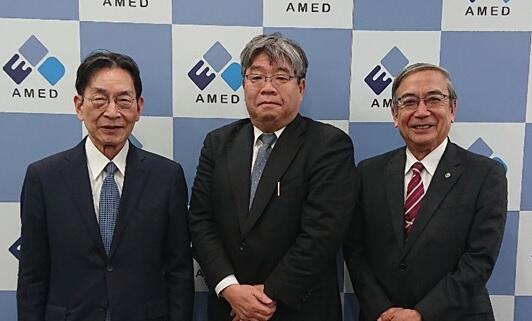To deliver early diagnostic drugs to patients as quickly as possible and strengthen Japan's competitiveness, a system similar to the Early Detection Research Network (EDRN) of the U.S. National Cancer Institute (NCI) should be established in Japan. Professor Kazufumi Honda of the Graduate School of Medicine at Nippon Medical School led the development of an apolipoprotein A2 isoform (apoA2-isoform). Honda proposed apoA2-isoform, which was included in January of this year for insurance coverage, as a drug to diagnose pancreatic cancer which is difficult to diagnose at early stage. He commented, "ApoA2 is currently used as a diagnostic agent for those suspected of pancreatic cancer, and in the future, I hope it will also be used for health checkups to help reduce mortality rates. In a sense, we have only just arrived at the bus stop at the entrance of the hiking trail."

Since early diagnoses of pancreatic cancer are difficult, the 5−10-year survival rate is the worst among solid cancers, and mortality is ranked fourth. If targets can be narrowed down through health checkups and in turn a detailed medical examination is performed for those suspected of having pancreatic cancer, mortality may be reduced in the future. However, the U.S. Task Force on Early Diagnosis and Disease Prevention states that image screening in asymptomatic populations is meaningless except for familial illnesses.
When Honda was at the National Cancer Center Research Institute, he was involved in reverse translational research (RTR) to resolve the basic research problems arising from clinical practice issues and developed biomarkers for the early diagnosis of pancreatic cancer. He performed blood analyses for healthy individuals and pancreatic cancer patients using the matrix-assisted laser desorption/ionization (MALDI) method. In these analyses, he found that pancreas disease progresses if the balance deviates between the AT and ATQ types of the protein ApoA2. He thought that the finding could be used as a blood biomarker for pancreatic cancer and conducted joint research at seven medical facilities in Japan using research reagents to prove the concept. He also conducted international joint research with the WHO's International Agency for Research on Cancer (IARC). Clinical research was performed using pre-diagnosis samples for pancreatic cancer, and the utility was confirmed.
Honda also conducted collaborative research with Heidelberg University in Germany (the largest high-volume center for pancreatic cancer in Europe). The research demonstrated that his method had a higher sensitivity in detecting precancerous pancreatic lesions in healthy individuals than CA19-9, which has been put into practical use as a tumor marker for cancers of the digestive system, such as pancreatic, bile duct, gallbladder, gastric, and colorectal cancers. Based on these observations, he provided the research results to TORAY Industries and produced a diagnostic test kit. Clinical performance tests undertaken to obtain approval as an extracorporeal diagnostic agent indicated that the estimated AUC value for distinguishing pancreatic cancer was higher than that of CA19-9. The sensitivity reached a high value of 70% when combined with CA19-9.
TORAY developed a diagnostic agent that accurately estimates the concentration of the apoA2 isoform and received production and sales approvals from the Ministry of Health, Labour and Welfare in June 2023. Furthermore, on January 31 of this year, the agent was covered by insurance as a diagnostic material for patients suspected of having pancreatic cancer.
In the present case, AMED supported the proof of concept through the Next Generation Cancer Medicine Research Project (Ministry of Education, Culture, Sports, Science and Technology) and the Innovative Cancer Medicine Practical Application Research Project (Ministry of Health, Labour and Welfare) assisted physician-led and corporate clinical trials. Additional support funds in the medical field were used to accelerate international joint research.
Strengthening Japan's Competitiveness
Honorary President Tomomitsu Hotta (National Cancer Research Center, AMED Disease/Cancer Coordinator) said, "In 2018, the next-generation cancer PO [program officer] and the innovative cancer PO [program officer] exchanged their opinions on inter-project collaboration and progressed the promising investigations from the next generation-research to innovative cancer research. As the result, we were able to achieve a smooth transition among multiple projects and speed up the research and development. It has been nine years since AMED was established. Awareness of researchers has been improved, and they are now able to determine clearly the landing point and deepen their research."
Honda and others built the "Platform of Evaluation for Biomarker of Cancer Early Detection (P-EBED)" as a part of their next-generation cancer project. National Hospital Organization Osaka National Hospital, Osaka University, Tokyo Dental College, National Cancer Center Research Institute, Nippon Medical School, Toho University, and Hyogo Medical University participated in this platform for obtaining data for the regulatory filing of Japanese biomarker candidates, providing other types of support for such filing, and rapidly verifying overseas biomarkers. This platform is modeled after the EDRN of the NCI.
Honda said, "We devised a framework with the cooperation of many people, but the scale is smaller than that of the original NCI. The EDRN stores the serum samples from healthy individuals and various patients without age bias, and the NCI public fund is to conduct validation work on the developed new biomarker candidates. ApoA2 was also verified by the EDRN. With this system, we can accelerate the development of diagnostic agents, different from the liquid biopsy, in which Japan has an advantage."'
AMED President Yoshinao Mishima said, "While discussions with the related ministries and agencies are necessary, this scheme is one of the good functions of AMED."
This article has been translated by JST with permission from The Science News Ltd. (https://sci-news.co.jp/). Unauthorized reproduction of the article and photographs is prohibited.




